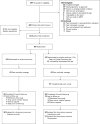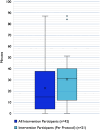Effect of a nurse-avatar guided discharge education smartphone application in people after acute coronary syndrome: a randomized controlled trial
- PMID: 40703122
- PMCID: PMC12282362
- DOI: 10.1093/ehjdh/ztaf036
Effect of a nurse-avatar guided discharge education smartphone application in people after acute coronary syndrome: a randomized controlled trial
Abstract
Aims: Discharge education reduces recurrent cardiac events in people after acute coronary syndrome (ACS). This trial investigates the effectiveness of a self-administered avatar-based discharge education application (app) on knowledge and clinical outcomes among inpatients compared with usual care.
Methods and results: Single-centre randomized controlled trial of adults hospitalized with ACS who were being discharged home. The app addressed heart disease diagnosis, treatment, risk factors, symptoms, and secondary prevention. Primary outcome was heart disease knowledge at three months. Secondary outcomes were quality of life, cardiac rehabilitation attendance, hospital re-presentations, symptom beliefs, physical activity, and smoking status. Satisfaction and app costs were also evaluated. Participants (n = 84) were 86% male and aged 60 ± 11 years. Both groups had improved knowledge and quality of life. There was no difference in knowledge between groups at three months after adjusting for baseline scores [0.88 points, 95% confidence interval (CI) -5.00, 6.76]. Cardiac rehabilitation attendance was 74% and 64% in the intervention and control groups, with no differences between groups (relative risk 1.15, 95% CI 0.87, 1.51). Ninety-two per cent found the app easy to use, but only 50% used the app as anticipated. Economic analysis showed that the intervention was dominant.
Conclusion: In this sample of people with ACS with high cardiac rehabilitation attendance, the app was highly acceptable but did not improve knowledge compared with usual care. Knowledge improved in both groups and may have potential to reduce cost to the health service with the app. Further work should explore the most appropriate target audience for app-based education.
Clinical trial registration: ACTRN12622001436763.
Keywords: Acute coronary syndrome; Cardiac rehabilitation; Coronary heart disease; Digital health; Randomized controlled trial; Secondary prevention.
© The Author(s) 2025. Published by Oxford University Press on behalf of the European Society of Cardiology.
Conflict of interest statement
Conflict of interest: none declared.
Figures
Similar articles
-
Home treatment for mental health problems: a systematic review.Health Technol Assess. 2001;5(15):1-139. doi: 10.3310/hta5150. Health Technol Assess. 2001. PMID: 11532236
-
Patient education in the management of coronary heart disease.Cochrane Database Syst Rev. 2017 Jun 28;6(6):CD008895. doi: 10.1002/14651858.CD008895.pub3. Cochrane Database Syst Rev. 2017. PMID: 28658719 Free PMC article.
-
Falls prevention interventions for community-dwelling older adults: systematic review and meta-analysis of benefits, harms, and patient values and preferences.Syst Rev. 2024 Nov 26;13(1):289. doi: 10.1186/s13643-024-02681-3. Syst Rev. 2024. PMID: 39593159 Free PMC article.
-
Computer and mobile technology interventions for self-management in chronic obstructive pulmonary disease.Cochrane Database Syst Rev. 2017 May 23;5(5):CD011425. doi: 10.1002/14651858.CD011425.pub2. Cochrane Database Syst Rev. 2017. PMID: 28535331 Free PMC article.
-
Nutritional interventions for survivors of childhood cancer.Cochrane Database Syst Rev. 2016 Aug 22;2016(8):CD009678. doi: 10.1002/14651858.CD009678.pub2. Cochrane Database Syst Rev. 2016. PMID: 27545902 Free PMC article.
References
-
- Peters SA, Colantonio LD, Dai Y, Zhao H, Bittner V, Farkouh ME, et al. Trends in recurrent coronary heart disease after myocardial infarction among US women and men between 2008 and 2017. Circulation 2021;143:650–660. - PubMed
-
- Briffa TG, Hobbs MS, Tonkin A, Sanfilippo FM, Hickling S, Ridout SC, et al. Population trends of recurrent coronary heart disease event rates remain high. Circ Cardiovasc Qual Outcomes 2011;4:107–113. - PubMed
LinkOut - more resources
Full Text Sources




